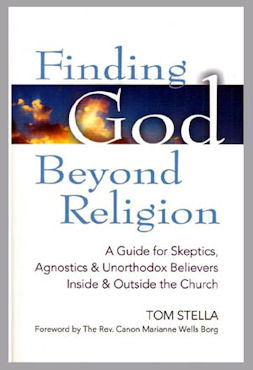
|
Posted June 11, 2013
Book: Finding God Beyond Religion: A Guide for Skeptics, Agnostics & Unorthodox Believers Inside and Outside the Church Author: Tom Stella Skylight Paths. Woodstock, Vermont. 2013. Pp. 126 An Excerpt from the Jacket:
"No longer sustained by easy answers, we may find ourselves standing before a three-pronged fork in the road: we can wander in the direction of conventional beliefs and practices, we can reject God and turn away from religion altogether, or we can embrace our uncertainty as an invitation to a more vital understanding of both God and religion." An Excerpt from the Book: Discovering God in the Midst of Evil Theodicy is the defense of God's goodness and omnipotence in the face of evil. An apology of sorts, theodicy attempts to prove what has come into question, to make a case for God's benevolence despite evidence to the contrary. But when we realize that the problem of evil is a problem with our concept of God, theodicy becomes irrelevant. What is needed instead is a theology that allows God to exist in the midst of evil. Episcopal priest and theologian Robert Farrar Capon addresses this point: "If God seems to be in no hurry to make the problem of evil go away, maybe we shouldn't be either. Maybe our compulsion to wash God's hands for him is a service he doesn't appreciate. Maybe --- all theodices and nearly all to the contrary --- evil is where we meet God. . . .maybe ---- just maybe ---if we ever solved the problem, we'd have talked ourselves out of a lover." In dealing with the problem of evil Capon is not interested in its origin or in the fact that evil calls God's presumed goodness and power into question. Rather, his concern --- and mine --- is that we not allow the reality of evil to blind us to the loving Presence present in and with us in our suffering. Evil has always been part of the human condition; why or whence it comes is of less interest to me than the wonder of discovering God in its midst. I would venture to say that the vast majority of religions, Christian and otherwise, teach that God is capable of redirecting the course of events that we experience as tragic or hurtful. If we pray hard enough, make sufficient sacrifices, or get our lives straightened out, God just might work the magic that will turn things around. And so we are prone to bargain with God, promising, "If you get me through this, I'll go back to church, stop doing drugs, work at a soup kitchen," and so on. I used to bargain with God in this fashion, and I found hope and consolation in the belief that intervention was possible. I do so no longer. Perhaps my current belief has been influenced by my disappointment in God's failure to respond as I would like, but what I really think is that my faith has matured beyond the instinctual desire to be spared from the sometimes harsh occurrences of life. Don't get me wrong. I still prefer pleasure over pain and joy over sorrow, but I have now come to embrace the reality of evil without the expectation of being delivered from it by divine intervention. I have also come to believe that the power of God lies not in the miraculous ability to right wrongs but in the sometimes undetectable yet enduring Presence that accompanies us in good times and in bad. Writing from the same notion of God that this book posits, Christian theologian Marcus Borg supports the idea of divine presence as opposed to divine intervention: "Rather than speaking of divine intervention, panentheism speaks of divine intention and divine interaction. Or, to use sacramental language, it sees the presence of God "in, with and under" everything --- not as the direct cause of events, but as a presence beneath and within our everyday lives." Table of Contents: 1. God beyond religion 2. What becomes of prayer if there is no God? 3. From belief to faith 4. Jesus: the way, or in the way 5. Why didn't someone tell me I'm a mystic? 6. Inspiration is not dictation 7. Morality as right relationship 8. What problem of evil? 9. Church with a mission, mission with a church 10. Epilogue: a spiritual epoch on the rise |
|
